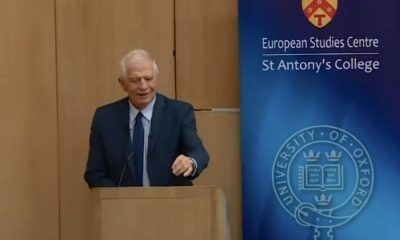EU
#EUngười báo cáo kêu gọi trách nhiệm giải trình cao hơn trong tài chính của EU

 The European Court of Auditors has called for an increased emphasis on value added in the EU Budget, along with more flexibility and transparency, and greater accountability.
The European Court of Auditors has called for an increased emphasis on value added in the EU Budget, along with more flexibility and transparency, and greater accountability.
The proposals are made in a briefing paper entitled Future of EU finances: Reforming how the EU Budget operates. The paper is the auditors’ response to the European Commission’s Reflection Paper on the future of EU finances – an important step in developing the next multiannual financial framework.
Jan Gregor, the member of the European Court of Auditors responsible for the Briefing Paper, said: “Although it is not for the European Court of Auditors to give its views on the size or allocation of EU expenditure or on the choice of EU revenues, it is our role to provide advice on improving the financial management, transparency and accountability of the EU budget system.”
The auditors’ main proposals are:
Define EU value added
The auditors call for a robust concept of EU value added to be used to identify opportunities for adding value in the EU Budget, evaluating the performance of spending programmes and assessing the risks to EU finances of financial instruments and guarantees. The concept should also provide a more comprehensive and accurate notion of the costs, benefits and net balances of EU membership, say the auditors. The auditors propose that the European Commission should analyze both the financial and the non-financial advantages of EU membership.
Make the EU budget more responsive
The auditors propose improving the EU Budget’s responsiveness to changing circumstances by making it more flexible and introducing a system of reserves to cover long-term spending and unforeseen events. Publish a comprehensive financial plan The auditors propose that the Commission should publish a medium-to-long term financial plan for the EU Budget to complement the proposal for the next multiannual financial framework. It should include the expected outstanding commitments, prefinancing and contingent liabilities, a payment forecast, an analysis of the economic and financial context and a risk assessment. The main elements of the plan should be updated annually.
Put more emphasis on performance
The auditors propose aligning EU financial planning with strategic priorities, defining the key results to be achieved, reducing the number of spending programmes, objectives and indicators and making reporting more streamlined and accessible.
Make EU finances more transparent and accountable
The auditors call for full democratic oversight of all EU finances. The same principles of accountability and transparency should apply to bodies inside the EU Budget, such as the European Commission, and those outside such as the European Central Bank and the European Investment Bank (EIB).
Carry out public audits of all EU-related bodies
The auditors say they should be able to audit all EU bodies and also bodies created outside the EU legal order which implement EU policies. This would include the European Defence Agency, the proposed European Monetary Fund, the European Stability Mechanism and the EIB’s non-EU Budget-related operations.
During the second quarter of 2018, the EU Auditors also plan to present their views on the Commission’s proposal for the next multiannual financial framework, on the future of the Common Agricultural Policy, on simplifying cohesion policy and on simplifying research and innovation programmes. In addition, they plan to issue Opinions on the legislative proposals for the own resources decision and on legislation for sector spending programmes, as required.
Chia sẻ bài viết này:
-

 Common Ngoại giao và Chính sách An ninh3 ngày trước
Common Ngoại giao và Chính sách An ninh3 ngày trướcNgười đứng đầu chính sách đối ngoại của EU đưa ra quan điểm chung với Vương quốc Anh trong bối cảnh đối đầu toàn cầu
-

 NATO5 ngày trước
NATO5 ngày trướcÁc ý từ Moscow: NATO cảnh báo về chiến tranh lai của Nga
-

 EU4 ngày trước
EU4 ngày trướcNgày Tự do Báo chí Thế giới: Dừng Truyền thông Ban công bố Kiến nghị của Châu Âu chống lại việc Chính phủ Moldova đàn áp báo chí.
-

 Kyrgyzstan2 ngày trước
Kyrgyzstan2 ngày trướcTác động của sự di cư hàng loạt của người Nga đối với căng thẳng sắc tộc ở Kyrgyzstan



























